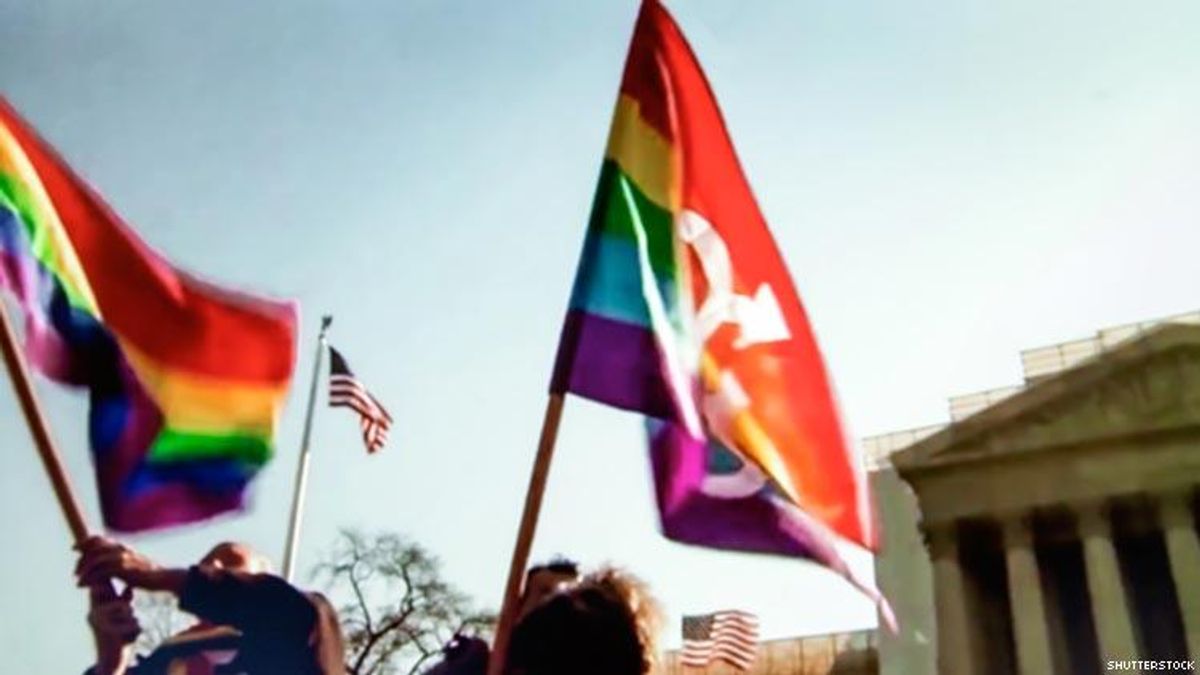In the wake of this month's inconclusive Supreme Court decision in Masterpiece Cakeshop v. Colorado Civil Rights Commission,here's a prediction of what happens next: another wave of lawsuits and state bills aimed at sanctioning discrimination against LGBT people.
This is exactly what opponents of LGBT equality have been doing since the Supreme Court's 2015 Obergefell decision made marriage equality the law of the land. They have orchestrated dozens of lawsuits like Masterpiece Cakeshop seeking to undermine our national consensus that when a business opens its doors to the public, it should be open to everyone, on the same terms. There are now at least seven more cases in the pipeline to the Supreme Court involving businesses citing religious beliefs as justification for refusing to serve same-sex couples (like the antigay florist case punted yesterday by the justices). Unfortunately, the Masterpiece decision will provide only limited guidance in resolving these cases.
And it's not just about lawsuits; opponents also are pursuing an aggressive legislative strategy to achieve their goals. Since 2015, more than 350 anti-LGBT bills have been introduced in the states to undermine LGBT rights. It's taken all the grit and power the LGBT community and its allies can muster to keep all but 17 of these bills from becoming law. Among the laws passed were seven that allow adoption agencies to discriminate against gay couples, while opening the door to discrimination against other minorities. With the uncertainties created by the Masterpiece decision, we can expect another flood of these measures when the state legislatures come back into session in 2019.
A key goal of these efforts is to sap the resources and resolve of the LGBT movement as pro-LGBT groups are forced to try and counter every proposal that pops up. In the face of this "whack-a-mole" reality, the movement for LGBT equality could likely defeat many measures sanctioning bias through intense public education and lobbying activities. But every year, some of the measures will become law, and in 10 to 15 years, the rights and dignity extended to gay and lesbian couples could be profoundly undermined in many parts of the country.
We saw this same thing happen with Roe v. Wade. Because of a nearly identical "whack-a-mole" approach, the 1973 Supreme Court ruling affirming a woman's legal right to abortion is now a hollow shell in more than two dozen states that have consistently sought to chip away at those rights. Reproductive health leaders have been working for years to try and slow the erosion of women's reproductive rights in the states.
What's a path forward for the LGBT movement? One practical way to secure marriage equality and basic civil rights protections for LGBT people over the long run is through a new federal law that extends to LGBT people the same protections from discrimination afforded to other Americans. Such a law would end the patchwork of state-based statutes that today serve to outlaw antigay discrimination in 22 states while allowing it in 28.
In the same way that the Civil Rights Act of 1964 invalidated Jim Crow laws in nearly 20 states, the federal approach would effectively repeal many of the laws sanctioning bias that have passed in recent years. Moreover, because a nationwide act would prevent states from taking steps to limit its protections, it would also go a long way toward forestalling the adoption of discriminatory measures in the future. Finally, a federal nondiscrimination law would constrain the ability of the executive branch to use executive orders and agency rules to permit anti-LGBT bias, something that is happening with great frequency under the current administration.
Of course, working for federal legislation does not mean walking away from the state-based challenges. During the marriage equality fight and in the years since then, we saw time and time again the power of standing up to the forces of intolerance and working resolutely to change hearts and minds. Measures that seemed like slam dunks for anti-LGBT forces -- overly broad policies wrapped in "religious liberty" and "bathroom bills"--have backfired.
Whether at the local, state or national level, the challenge for supporters of LGBT equality is to help people see and understand that anti-LGBT discrimination remains a real-life barrier to equality and opportunity for LGBT people everywhere. Let's make sure our neighbors, family members, and policymakers understand the truth and the impact of anti-LGBT bias, not yesterday but right now. Yes, even today, 25 percent of LGBT people say they have experienced discrimination in the past year because of their sexual orientation or gender identity. More than 70 percent of LGBT youth ages 13 to 17 report feelings of worthlessness and hopelessness in the past week.
In addition to raising awareness and understanding about the problem, we have to make the case that a federal law is the only way to address it in a decisive way. Such a law also would curtail years and years of trench warfare between supporters and opponents of LGBT equality.
As a nation, we came to the realization more than 50 years ago that if we left it up to individual states, all Americans would never be protected from discrimination because of their race, religion, ethnicity, and national origin. Today, that is the same reality for LGBT people. It is time -- long past time, in fact -- for the nation to take a stand. What can we do? Two ways to take action are to get in touch with your statewide equality group and join the Open to All campaign.
Yes, the Masterpiece Cakeshop decision will mean more struggle for the LGBT movement, but let's turn this uncertain moment into something positive: a federal response to anti-LGBT bias. Once and for all.
MATT FOREMAN is senior program director of gay and lesbian rights at the Evelyn and Walter Haas, Jr. Fund, overseeing the fund's extensive support for the drive for equal rights and opportunities for LGBT people.


















































































